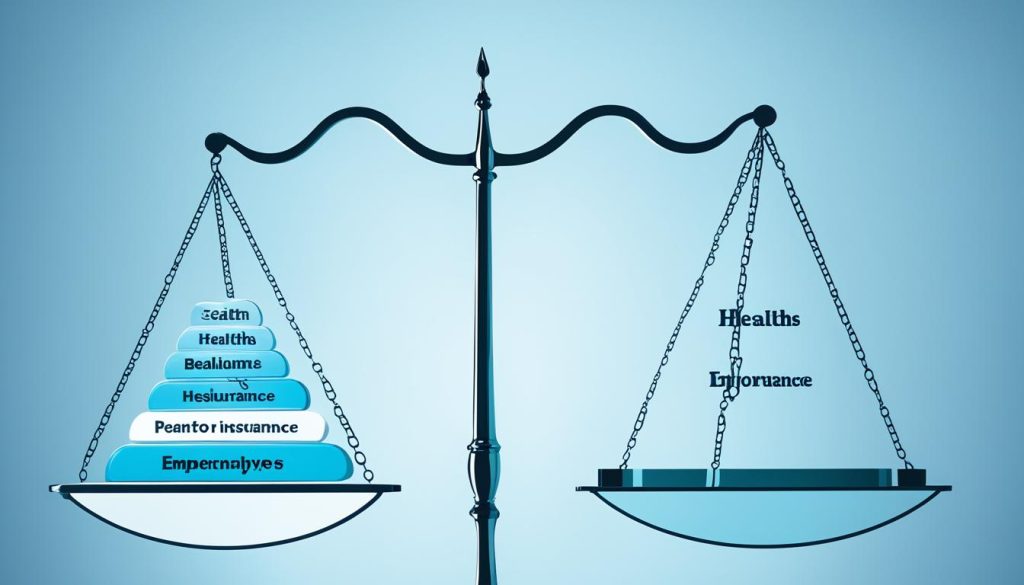When it comes to securing your family’s future, there’s nothing more important than having comprehensive coverage. That’s where Trinet Life Insurance comes in. With their range of options, you can find a policy that meets your specific needs and provides the peace of mind and financial security you deserve.
Trinet Life Insurance offers a variety of benefits that make it an excellent choice for individuals and families alike. From their reliable customer service to their flexible policy options, they prioritize your well-being and ensure that you are covered for whatever life throws your way.
Key Takeaways:
- Trinet Life Insurance provides comprehensive coverage for your family’s future.
- Their policies offer peace of mind and financial security.
- Trinet Life Insurance has flexible options to meet your specific needs.
- Reliable customer service is a top priority for Trinet Life Insurance.
- With Trinet Life Insurance, you can rest easy knowing you’re protected.
The Importance of Proof of Health Insurance
Having proof of health insurance is critical in various situations. It is necessary to show your proof of insurance to receive healthcare services, ensure proper billing, and keep records.
In medical emergencies, hospitals and emergency rooms are required to treat you even without proof of insurance. However, having proof of health insurance can prevent you from being billed for the full cost of treatment. It allows for a smoother and more efficient process in quickly addressing your medical needs while appropriately covering or compensating for health-related services, prescriptions, and medical devices.
By presenting proof of health insurance, you are ensuring that your healthcare providers have the necessary information to bill your insurance company accurately. This helps avoid incorrect billing and reduces the likelihood of being charged for services that should be covered by your insurance.
Proper billing is vital for maintaining the financial integrity of the healthcare system and ensuring that both patients and providers are accurately and fairly compensated for the services rendered.
Additionally, having proof of health insurance allows you to keep detailed records of your medical history and expenses. These records can be valuable for tax purposes, reimbursement claims, or future reference.
While instances like medical emergencies may outweigh the need for immediate proof of health insurance, it is still highly recommended to carry some form of identification with your insurance information, such as an insurance card or digital proof, to streamline the process and avoid any complications that may arise.
Understanding Health Insurance for Tax and Legal Purposes
Health insurance not only provides financial protection and access to medical care, but it also has implications for tax and legal purposes. As a policyholder, you may receive forms like Form 1095-A, Form 1095-B, or Form 1095-C which can provide valuable information to help you prepare your income tax returns.
Form 1095-A is specific to individuals who enrolled in a Marketplace health insurance plan, and it details information about the coverage, premium amounts, and any premium tax credits received. This form is crucial for accurately reporting your health insurance coverage and any tax credits you may be eligible for.
Form 1095-B is received by individuals who have health insurance coverage that is not purchased through the Health Insurance Marketplace. It provides information about your enrollment in the coverage and can be used to validate your health insurance for tax purposes.
Form 1095-C is applicable to employees who are offered employer-sponsored health coverage. This form provides information about the health insurance coverage offered by your employer and your enrollment status.
It is important to note that these forms should not be attached to your tax return when filing, as the IRS already receives the information directly from the insurance providers. The forms serve as documentation for you and allow you to reconcile your coverage with what is reported to the IRS.
While the federal requirement to prove health insurance coverage for tax purposes has been repealed, some states still penalize individuals who do not have health insurance. It is essential to understand the specific requirements of your state and ensure that you have the necessary documentation to avoid any potential penalties.
The Link Between Health Insurance and Taxes
Health insurance and taxes are interconnected in several ways. By understanding how health insurance affects your tax situation, you can ensure that you are maximizing any available benefits and complying with all legal requirements.
- Marketplace Coverage and Premium Tax Credits: If you purchased health insurance through the Marketplace, you may be eligible for premium tax credits based on your income. These tax credits can help reduce the cost of your monthly premiums. Form 1095-A provides the necessary information to correctly calculate and claim these credits on your tax return.
- Mandatory Reporting: The Affordable Care Act requires individuals to report their health insurance coverage to the IRS. This requirement helps ensure that individuals have the necessary coverage and allows the IRS to enforce any penalties in states where applicable. The information provided on Forms 1095-A, 1095-B, or 1095-C helps verify the coverage reported on your tax return.
- Medical Expenses: Health insurance premiums and certain out-of-pocket medical expenses may be tax-deductible. If you itemize your deductions, you can include medical expenses that exceed a certain percentage of your adjusted gross income. Keep track of your medical expenses and consult with a tax professional to determine your eligibility for deductions.
- Health Savings Accounts (HSAs) and Flexible Spending Accounts (FSAs): These accounts allow you to set aside pre-tax dollars to pay for qualified medical expenses. Contributions to HSAs are tax-deductible, while withdrawals for qualified medical expenses are tax-free. FSAs provide a similar tax advantage but are typically offered through an employer. Understanding the tax benefits and rules associated with these accounts can help you maximize your savings.
It is advisable to consult with a tax professional or certified public accountant (CPA) when navigating the intersection of health insurance and taxes. They can provide guidance tailored to your specific situation and ensure that you are taking the maximum advantage of any available deductions or credits.
By understanding the relationship between health insurance and taxes, and staying informed about any changes in regulations or requirements, you can effectively manage both your health coverage and your tax obligations.

Tips for Keeping Proof of Health Insurance Safe
When it comes to your proof of health insurance, it’s crucial to ensure its safety and accessibility. By taking a few simple steps, you can keep your important documents secure and up-to-date, giving you peace of mind in case of emergencies or unexpected situations.
- Store it securely: Find a safe place to store your proof of health insurance when you’re not carrying it with you. Consider a locked drawer, a fireproof box, or a secure digital storage option. Choose a method that works best for you and provides the necessary protection for your documents.
- Keep your contact information up-to-date: It’s essential to have accurate and up-to-date contact information with your insurance carrier. In case you need to access your proof of insurance quickly, having the correct contact information will help you get the assistance you need efficiently.
- Create backup copies: Make copies of your proof of health insurance and keep them in a secure location. This ensures that even if the original documents are lost or damaged, you have alternative copies available. Consider keeping a digital copy as well to have easy access to your proof of insurance from any device.
- Share access with a trusted person: In case of emergencies where you are unable to provide your proof of health insurance, it’s vital to have someone else who can find and access your documents on your behalf. Share the location and necessary details with a trusted family member or close friend, giving them the ability to assist you when needed.

By following these tips, you can ensure the safekeeping of your proof of health insurance. This small effort can make a significant difference in critical situations and provide you with the necessary support you need. Remember, being proactive in keeping your documents secure ultimately contributes to your overall peace of mind and preparedness.
How Health Insurance Companies Determine Employer Costs
Health insurance costs for small businesses are influenced by several factors. Understanding these factors can help small business owners make informed decisions when it comes to selecting health insurance plans for their employees.
1. Size of the Business
The number of employees in a small business can impact health insurance costs. Generally, larger businesses may have access to more affordable group rates compared to smaller businesses.
2. Age of Employees
The age of employees is another factor that can affect health insurance premiums. Premiums tend to rise as employees get older due to increased healthcare needs and potential risks associated with age-related health conditions.
3. Tobacco Use
Tobacco use can have a significant impact on health insurance costs. Insurance companies may charge higher premiums for employees who smoke or use other tobacco products due to the increased health risks associated with these habits.
4. Business Location
The location of a small business can influence health insurance premiums. Factors such as local healthcare costs, state regulations, and competition among insurers can vary from one location to another, resulting in different premium rates.
5. Family Size
The size of an employee’s family can also impact health insurance costs. Insurers may consider the number of dependents covered under the plan when determining premiums.
“Health insurance costs for small businesses are influenced by factors such as the size of the business, the age of employees, tobacco use, business location, and family size.”
While these factors play a significant role in determining employer costs for health insurance, it’s important to note that insurers are not allowed to vary premiums based on an employee’s health status. This ensures that employees with pre-existing conditions or higher healthcare needs are not unfairly penalized.

Types of Employee Benefits Small Businesses Can Offer
Small businesses have the opportunity to provide their employees with a wide range of benefits that go beyond the mandatory offerings. By offering comprehensive benefits, employers can attract and retain talented individuals while contributing to their overall well-being.
Medical Insurance
One of the most common employee benefits provided by small businesses is medical insurance. This coverage helps employees access essential healthcare services, ensuring their physical well-being and peace of mind. Medical insurance can cover a variety of expenses, including doctor visits, hospital stays, prescription medications, and preventive care.
Dental and Vision Insurance
In addition to medical insurance, small businesses can offer dental and vision insurance to their employees. These benefits provide coverage for routine check-ups, dental treatments, eye exams, and the cost of glasses or contact lenses. By including dental and vision insurance, employers prioritize the overall health of their employees, including their oral and visual well-being.
Retirement Plans
Many small businesses understand the importance of helping employees plan for their future. By offering retirement plans, such as a 401(k) or IRA, employers contribute to their employees’ financial security during their post-working years. This benefit allows employees to save for retirement through contributions made directly from their paycheck, often with the added benefit of employer matching.
Disability and Life Insurance
Small businesses can also provide disability and life insurance to protect their employees and their families in case of unexpected events. Disability insurance ensures a portion of an employee’s income is replaced if they become unable to work due to illness or injury. Life insurance provides financial support to an employee’s beneficiaries in the event of their death, helping to cover expenses such as funeral costs, outstanding debts, or ongoing financial needs.
Work-Life Balance Benefits
Work-life balance is a significant concern for many employees, and small businesses can support their workforce by offering benefits that promote a healthy balance between work and personal life. These benefits may include flexible work arrangements, telecommuting options, paid time off, and access to employee assistance programs (EAPs) that provide counseling and support services.
Tuition Reimbursement
Investing in employees’ professional development can benefit both the employer and the employee. Small businesses can offer tuition reimbursement programs, encouraging employees to pursue further education or job-related certifications. By supporting their employees’ educational goals, businesses foster a culture of growth, enhance employee loyalty, and facilitate the acquisition of new skills that benefit both the employee and the company.
By offering a comprehensive benefits package, small businesses elevate their attractiveness as employers, improve employee satisfaction, and foster a positive work environment. These benefits not only support the well-being of employees but also contribute to increased productivity and the long-term success of the business.

Creating a Comprehensive Benefits Package for Small Businesses
When it comes to attracting and retaining employees, providing a comprehensive benefits package is essential. It’s important to consider the needs and wants of your employees to create a package that meets their expectations. One way to gather valuable insights is by surveying your employees to understand their preferences and priorities.
Small businesses can also explore cost-saving strategies while designing their benefits package. For instance, offering high deductible health insurance coverage can help reduce premiums. Health savings accounts provide employees with a tax-advantaged way to save for medical expenses. Telehealth options can offer convenient and cost-effective access to healthcare services for employees.
Optimizing the overall cost structure is another key aspect to consider. By balancing various benefit options, small businesses can create a package that maximizes value for both the employer and employees.
Employee Needs and Wants
Understanding the needs and wants of your employees is crucial in creating a benefits package that resonates with them. A diverse workforce may have varied requirements, ranging from healthcare coverage to work-life balance benefits.
While health insurance is a staple in most benefits packages, additional offerings such as dental and vision insurance can further enhance employee satisfaction. These benefits not only address the health needs of employees but also contribute to their overall well-being.
Work-life balance benefits like flexible work arrangements, paid time off, and family leave policies are highly valued by employees. They help in maintaining a healthy work-life balance and can lead to increased job satisfaction and productivity.
A Strategic Approach
Designing a comprehensive benefits package requires a strategic approach that aligns with the overall goals and values of your business. It’s important to strike a balance between offering attractive benefits and managing costs effectively.
Consider analyzing industry benchmarks and trends to stay competitive in the market. This can help you understand the expectations of potential candidates and ensure that your benefits package stands out.
Remember, a well-designed benefits package not only attracts top talent but also plays a vital role in retaining employees. By taking a strategic approach, you can create a package that meets the needs of your employees while aligning with the goals of your business.
“A comprehensive benefits package demonstrates your commitment to your employees’ well-being and helps foster a positive work environment.” – Jane Smith, HR Director
By creating a comprehensive benefits package for your small business, you can meet the diverse needs and wants of your employees. This strategic approach ensures that your package is attractive, cost-effective, and contributes to employee satisfaction and retention.
Now that we have explored the importance of a comprehensive benefits package, let’s dive deeper into the specific benefits offered by Trinet Life Insurance in the next section.

Conclusion
Trinet Life Insurance offers comprehensive coverage that provides employees with financial security and peace of mind. By understanding the importance of proof of health insurance, the factors influencing health insurance costs, and the types of employee benefits small businesses can offer, employers can create a comprehensive benefits package that prioritizes employee well-being.
With Trinet Life Insurance, employees can enjoy the benefits of financial protection against uncertainties, ensuring a secure future for themselves and their loved ones. The comprehensive coverage offered by Trinet Life Insurance not only provides peace of mind but also supports employees in times of medical emergencies and healthcare needs.
By partnering with Trinet Life Insurance, businesses can demonstrate their commitment to their employees’ well-being, attracting and retaining top talent. Offering a tailored benefits package that includes Trinet life insurance benefits, along with other employee benefits, creates a strong foundation for businesses to thrive and employees to feel valued.




No comments! Be the first commenter?